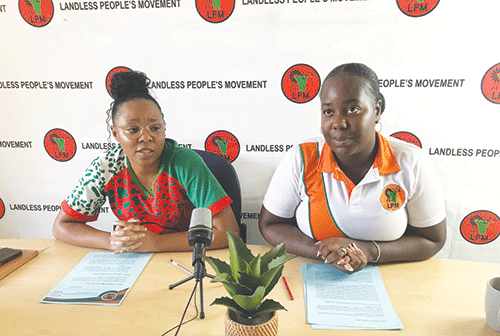Landless People’s Movement (LPM) lawmaker Utaara Mootu is calling for the immediate dismissal of education minister Anna Nghipondoka for allegedly bringing the education sector to its knees.
Mootu, who hardly minces her words, accused Nghipondoka of gross incompetence, which among other things inadvertently collapsed the education sector.
Speaking at a press conference yesterday, she highlighted the discrepancy between an insufficient 3% success rate and the alarming 77% of learners left without proper education, questioning the minister’s ability to address the failures within the education system.
“Seventy-seven percent of these learners will be flushed from the education system and will indulge in bad activities, contributing to the high rate of unemployment in the country,” the outspoken Mootu said.
Notably, the Namibia Senior Secondary Certificate Ordinary (NSSCO) and Namibia Senior Secondary Certificate Advanced Subsidiary (NSSCAS) level curriculum,
designed to equip students with essential skills, have unintentionally given rise to disparities in resource allocation and accessibility.
“Rural schools, in particular, face challenges in providing quality education due to insufficient infrastructure, limited teacher training, and inadequate learning materials, exacerbating the existing educational divide between urban and rural communities,” the lawmaker said.
She added that in Parliament, the orange army has made calls to President Hage Geingob to recall the minister, but those calls fell on deaf ears.
“For many Namibians, education is the key to getting ourselves and family members out of poverty, thus the denial of access to tertiary universities is a human right issue,” she said.
Mootu further stated that during the 2023 budget vote motivation, the minister identified N$209 million set aside to recruit additional teachers (850 teachers at pre-primary and secondary school levels) to address issues related to teacher-learner-ratio.
“We question the tender of N$255 million awarded to August 26 to construct 510 classrooms and 70 ablution blocks. What tangible results have come from August 26 receiving the tender?” Mootu wanted to know.
She said the indigenous language performances suffered a significant decline with an 83.8% at a D grade, while the top-performing languages are the European first languages, signalling a lack of interest in the native languages, which is a great concern.
Complex
Contacted for comment on those calling for her head, Nghipondoka initially had nothing to say.
“No comment,” she said in a brief text message.
On her part, education executive director Sanet Steenkamp, while treading carefully to avoid entering a political battlefield, reminded Namibians that their ministry is the biggest and most complicated in the land.
“Education itself is very complex to put the blame on the shoulders of the minister of education [Nghipondoka]. In my view, everyone has the right to express themselves how they feel,” she said.
Steenkamp hastened to say the ministry has never been invited to a forum by LPM to ventilate matters relating to their work and how they could improve.
“It is highly regrettable that statements have been made by these youth leaders. It is surprising that these leaders have no context, and these are leaders we expect to take the country forward in their capacity as national leaders, yet they fail to consult or reach out and understand the complexities. We have never failed to answer hard questions as a ministry, and we have never refused to talk to anyone,” Steenkamp said.
“To blame without showing genuine interest in engaging in dialogue, I find that petty… we have never shied away from discussions… we will continue to serve this country with the required integrity.”
Concerned
At the same press conference, LPM youth command leader Duminga Ndala said despite substantial investment in the education sector, results do not reflect the magnitude of the financial resources allocated.
“Out of the total of 40 682 learners who set for exams, only 10 261 will proceed to AS level. This situation underscores the imperative to conduct a comprehensive review of the education sector, given its profound implications for the country’s socio-economic status,” she said.
Diagnosing issues impeding quality education, Ndala pointed to inadequate infrastructure, lack of teaching materials and the shortage of teachers at most schools.
“The ministry should re-evaluate the teacher training programmes to ensure that they adequately prepare educators for the demands of teaching grades 11 and 12. In the same vein, efforts should be made to provide training teachers with the necessary resources, including teaching materials, technology access, professional development opportunities, and support systems. Adequate resources are essential for creating an environment where teachers can thrive and deliver high-quality education,” she said.
Unam
The LPM press conference follows an announcement Saturday by the University of Namibia (Unam) that it will only admit learners who have completed their grade 12.
Unam spokesperson Simon Namesho said the university, being a top-ranked institution, bases its entry requirements on the national grade 12 school-leaving certificate.
“This norm aligns with the general expectation that one should complete secondary education before entering higher education, ensuring a seamless transition and alignment between the basic and higher education sub-sectors,” he explained.
Before the Basic Education Reform, the Namibia Senior Secondary Certificate (NSSC), with a combination of subjects on higher and ordinary levels, was accepted by Unam as part of its admission requirements. In response to educational reforms and the national education conference of 2010, the NSSCAS level was introduced as the final school-leaving certificate.
Namesho added that Unam welcomed this reform, as it addresses concerns about the preparedness of NSSCO learners for university studies.
“The NSSCAS, emphasising depth, breadth of knowledge and critical thinking skills, aligns closely with the demands of the 4th and 5th Industrial Revolutions.”
Namesho emphasised that Unam’s current admission criteria are based on a combination of the NSSCAS as the final school-leaving certificate and the NSSCO.
“This is the norm in countries offering school-leaving certificates at different levels.”
Unam thus urged learners excelling in NSSCO examinations to progress to NSSCAS, stressing its importance for success at the university level.
– priscillamukokobi@gmail.com



